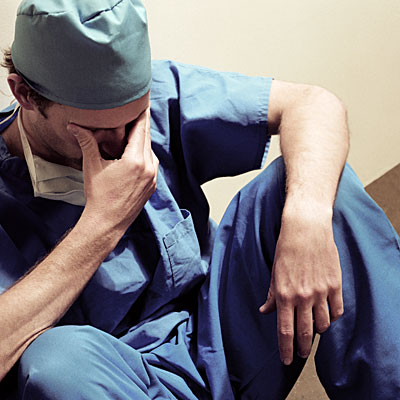Jobs and depression
By Tammy Worth
Some jobs are more depression-prone than others.
Here are 10 fields (out of 21 major job categories) in which full-time workers are most likely to report an episode of
major depression in a given year. But if you want to be a nurse (No. 4), it doesn’t mean you should pick another profession.
“There are certain aspects of any job that can contribute to or exacerbate depression,” says Deborah Legge, PhD, a licensed mental health counselor in Buffalo. "Folks with the high-stress jobs have a greater chance of managing it if they take care of themselves and get the help they need.”
 Nursing home/child-care workers
Nursing home/child-care workers
Personal-care providers top the list, with nearly 11% of people in this field reporting a bout of major depression. (The rate is 13% in the unemployed; 7% in the general population.)
A typical day can include feeding, bathing, and caring for others who are “often incapable of expressing gratitude or appreciation…because they are too ill or too young or they just aren’t in the habit of it,” says Christopher Willard, clinical psychologist at Tufts University and author of
Child’s Mind.
“It is stressful, seeing people sick and not getting a lot of positive reinforcement.”
 Food service staff
Food service staff
Ranking just below professional-care workers are the people who are serving the food at your favorite local digs. Wait staff often get low pay and can have exhausting jobs with numerous people telling them what to do each day.
While 10% of workers in general reported an episode of major depression in the past year, almost 15% of women in this field did so.
“This is often a very thankless job,” Legge says. “People can be really rude and there is a lot of physical exertion. When people are depressed, it is hard to have energy and motivation—when you have to be on, it is difficult.”
 Social workers
It’s probably not a huge surprise to find social workers near the top of this list. Dealing with abused children or families on the brink of every imaginable crisis—combined with bureaucratic red tape—can make for a demanding, stressful job that’s often 24-7.
“There can be a culture that says that to do a good job, you have to work really hard and often make sacrifices,” Willard says.
“Because social workers work with people who are so needy, it can be hard to not sacrifice too much to the job. I see that happen a lot with social workers and other caring professions, and they get really burned out pretty quickly.”
Social workers
It’s probably not a huge surprise to find social workers near the top of this list. Dealing with abused children or families on the brink of every imaginable crisis—combined with bureaucratic red tape—can make for a demanding, stressful job that’s often 24-7.
“There can be a culture that says that to do a good job, you have to work really hard and often make sacrifices,” Willard says.
“Because social workers work with people who are so needy, it can be hard to not sacrifice too much to the job. I see that happen a lot with social workers and other caring professions, and they get really burned out pretty quickly.”
 Health-care workers
Health-care workers
This includes doctors, nurses, therapists, and other professions that attract people who might end up giving a lot without saving a little for themselves. Health-care workers can have long, irregular hours and days in which other people’s lives are literally in their hands.
In other words, the stress can be off the charts.
“Every day they are seeing sickness, trauma, and death and dealing with family members of patients,” Willard says. “It can shade one’s outlook on the whole that the world is a sadder place.”
 Artists, entertainers, writers
Artists, entertainers, writers
These jobs can bring irregular paychecks, uncertain hours, and isolation.
Creative people may also have higher rates of mood disorders; about 9% reported an episode of major depression in the previous year.
In men, it’s the job category most likely to be associated with an episode of major depression (nearly 7% in full-time workers).
“One thing I see a lot in entertainers and artists is bipolar illness,” says Legge. “There could be undiagnosed or untreated mood disorders in people who are artistic…. Depression is not uncommon to those who are drawn to work in the arts, and then the lifestyle contributes to it.”
(Continued)